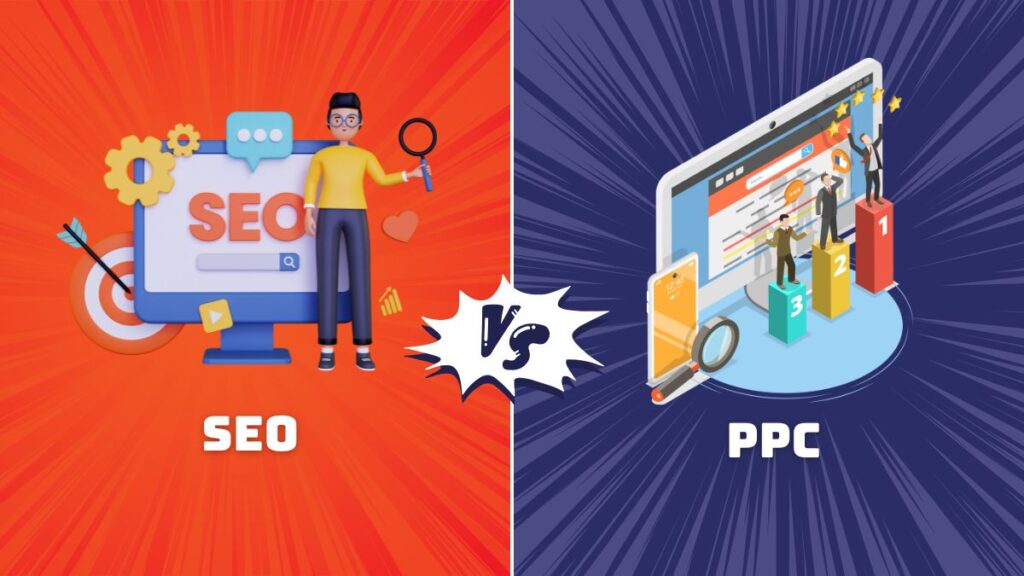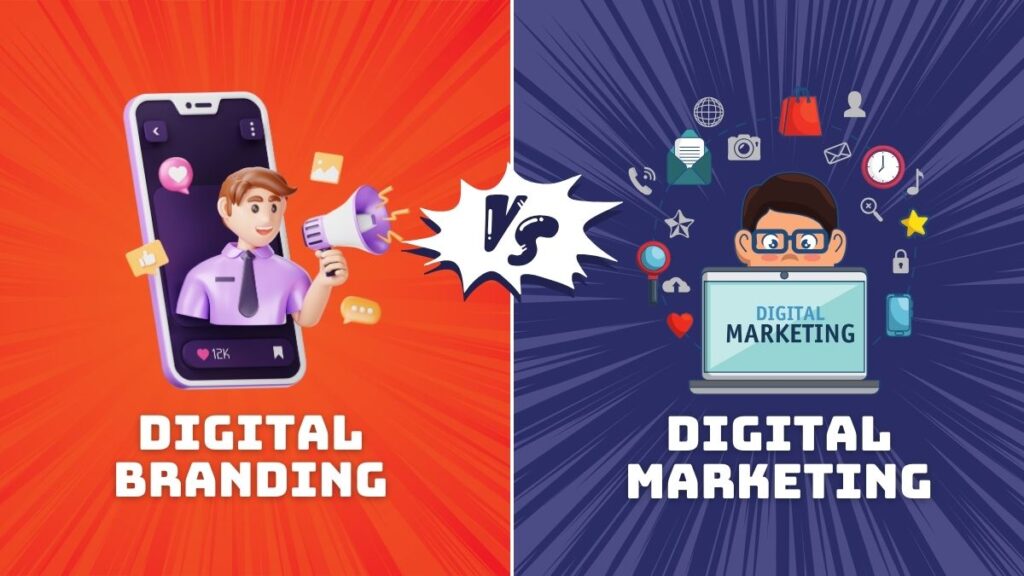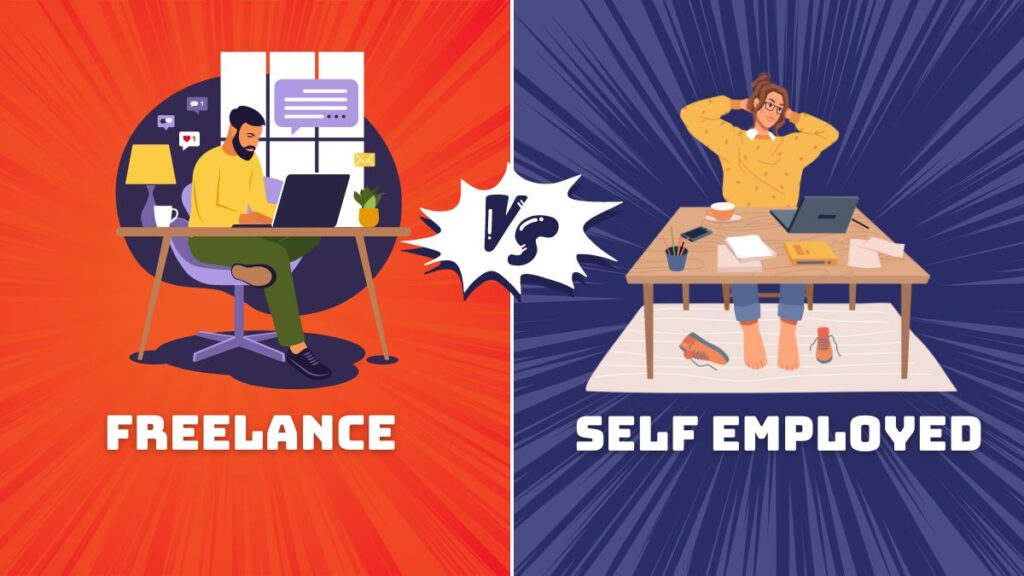Confused about SEO vs PPC? Discover the key difference between SEO and PPC to find out which one is best for your business goals.
Not sure whether to go with SEO or PPC to drive traffic to your website? You’re not alone—many businesses face this decision. Both strategies can help you get noticed online, but they work differently and offer different benefits.
In today’s digital world, choosing the right approach can be tricky. SEO (Search Engine Optimization) brings in organic traffic by improving your search engine rankings, but it takes time. PPC (Pay-Per-Click), on the other hand, gets you quick results with paid ads, but it costs money.
So, which one is right for you? Both have their pros and cons, and the key is knowing when and how to use each one. In this post, we’ll break down the differences between SEO and PPC and help you decide which is best for your business. Let’s get started!
SEO for Business: Is It Worth the Wait?
SEO helps your website show up higher in search results without paying for ads. It’s all about improving your website’s content and structure so search engines can find you more easily. When done right, SEO helps bring in more visitors who are already interested in what you offer.
Why Organic Search Traffic Matters?
Organic traffic is valuable because it comes from people who are actively searching for what you sell. For example, if you run a bakery, people searching for “best cupcakes near me” might discover your site without you paying for ads. It’s like having customers find you on their own!
Key SEO Strategies
Keyword Research: Find out what words your customers are searching for. If you sell shoes, keywords like “comfortable running shoes” could work.
On-page Optimization: Make sure your website’s content, titles, and descriptions are set up for those keywords. For example, include “comfortable running shoes” in your page titles and descriptions.
Off-page Optimization: Get other trusted websites to link to yours. This helps improve your website’s authority and search rankings.
Technical SEO: Make sure your website loads quickly and is easy for search engines to read.
Pros of SEO for Your Business
Long-Term Results: Once your website starts ranking well, it can bring in traffic for a long time without paying for every click.
Better ROI: Unlike PPC, where you pay for each click, SEO gives you more value over time, helping you attract customers without ongoing costs.
Builds Trust: People trust websites that appear at the top of search results. Being ranked high can help your business gain credibility.
Cons of SEO for Your Business
Takes Time: SEO isn’t an instant solution. It can take months to see real results.
Requires Expertise: SEO can get technical, so if you’re not familiar with it, you might need help to get it right.
Patience is Key: SEO is a long-term strategy, so you’ll need to be patient while you wait for results to come in.
When to Use SEO?
If you want steady, long-term growth and are willing to put in the work, SEO is a great option. It helps build lasting traffic that can keep coming in without the need to pay for ads every time.
Example: A local coffee shop that ranks for “best coffee near me” will attract people searching for coffee in their area, bringing in free, organic traffic over time.
PPC for Your Business: Fast Traffic, But Keep an Eye on the Budget
PC is all about paying for clicks. You bid on keywords, and your ad shows up when someone searches for those terms. You only pay when someone clicks on your ad. It’s a fast way to get your business in front of people, especially in crowded markets where getting noticed takes time.
How Bidding on Keywords Works?
With PPC, you choose the words that matter to your business, like “affordable running shoes” if you sell sneakers. The more you’re willing to pay per click, the higher your ad will appear on search results. So, the higher the bid, the better your chances of getting noticed.
Where You Can Advertise?
Google Ads: Show up in Google search results and on websites that partner with Google.
Social Media: Ads on Facebook, Instagram, LinkedIn, and Twitter help you target people based on their interests, age, location, and more.
Other Platforms: Don’t forget Bing Ads and display networks, which also give you a chance to advertise online.
Why PPC Works for Your Business?
Instant Visibility: PPC is perfect for when you need fast results. Once your ad is live, traffic starts coming in.
Targeted Reach: You can choose exactly who sees your ads, based on things like location, interests, and behavior.
Control Your Budget: You’re in charge of how much you spend, and you can tweak it based on what’s working.
Challenges of PPC for Your Business
Ongoing Costs: Unlike SEO, once your budget runs out, so does your visibility. Keep spending to keep showing up.
Needs Ongoing Attention: To get the best return on investment (ROI), you’ll need to monitor your ads and adjust them as needed.
Can Get Pricey: In competitive fields, the cost per click can add up fast, especially for high-demand keywords.
When Should You Use PPC?
PPC is perfect for businesses that want quick traffic, especially for special promotions or new products. It’s also great when you’re in a competitive market and need to stand out fast.
Example: A local coffee shop could use PPC to show up for searches like “best coffee near me” and attract customers in their area. The ad brings in customers right away, and they can adjust the budget to reach more people.
Difference Between SEO and PPC
Not sure whether SEO or PPC is right for your business? Both can drive traffic, but they work in different ways. Let’s take a quick look at the differences to help you choose the best option for your goals!
| Aspect | SEO (Search Engine Optimization) | PPC (Pay-Per-Click) |
|---|---|---|
| Cost | No direct cost for clicks, but requires investment in content and SEO efforts. | You pay for each click on your ad. |
| Time to Results | Takes time to see results (months). | Immediate results once the campaign is live. |
| Traffic Type | Organic (free) traffic from search engine rankings. | Paid traffic from ads in search results. |
| Control | Less control over rankings (depends on search engine algorithms). | Full control over ad placement and targeting. |
| Long-Term Benefits | Great for long-term, sustainable traffic. | Short-term visibility and quick results. |
| Targeting | Targets people based on their search intent (keywords). | Targets based on keywords, demographics, and interests. |
| Ongoing Costs | No ongoing costs once ranking is achieved. | Ongoing costs as long as the campaign runs. |
| Scalability | Organic traffic grows over time with consistent effort. | Can scale quickly by increasing budget. |
| Results | Builds brand credibility and trust. | Immediate visibility but less trust. |
SEO vs PPC Statistics
When deciding between SEO and PPC for your business, it helps to know the numbers behind each strategy. Here are some key stats that highlight the strengths and challenges of SEO and PPC:
SEO Statistics
Organic Search Drives More Traffic
53% of all website traffic comes from organic search. (Source: BrightEdge)
75% of users never scroll past the first page of search results. (Source: HubSpot)
Long-Term ROI
Organic search results have a click-through rate (CTR) of 31.7% for the top organic result on Google. (Source: Backlinko)
SEO leads have a 14.6% close rate, compared to just 1.7% for outbound leads like direct mail or PPC. (Source: Search Engine Journal)
Importance of Mobile Optimization
61% of search queries come from mobile devices. (Source: Statista)
Websites with mobile-friendly designs rank better on Google, as mobile-friendliness is a ranking factor.
Time to See Results
It can take 3-6 months to see significant results from SEO efforts. (Source: Moz)
PPC Statistics
Instant Results
Businesses make an average of $2 for every $1 spent on Google Ads. (Source: Google Economic Impact Report)
65% of all clicks on paid ads are from people who are ready to make a purchase. (Source: WordStream)
Targeted Traffic
70% of users who are ready to buy click on paid search ads. (Source: WordStream)
49% of people who click on paid ads are more likely to convert compared to those clicking on organic results. (Source: Google)
Cost of PPC
The average cost-per-click (CPC) on Google Ads can range from $1 to $2 for Google search ads, but it can rise sharply in competitive industries like law or insurance. (Source: WordStream)
45% of small businesses spend between $500 to $5,000 per month on PPC campaigns. (Source: WordStream)
PPC Is Great for Quick Wins
41% of paid clicks go to the top three ads on search engines. (Source: WordStream)
PPC vs SEO Salary
Wondering whether to invest in SEO or PPC for your business? Understanding the salaries and roles can help you choose the right strategy for your goals. Let’s dive in!
SEO Salary
An SEO specialist in the U.S. usually earns about $50,000 per year. For businesses, hiring an SEO expert is about focusing on long-term success by improving organic search rankings. This helps drive steady traffic and build trust with your audience over time.
PPC Salary
A PPC manager typically makes around $55,000 per year. For businesses, a PPC manager brings quick, targeted traffic through paid ads, offering faster results and more control over how and when you appear in search results.
Both roles are valuable, but the right choice depends on whether your business needs long-term growth (SEO) or immediate visibility (PPC).
Common Misconceptions About the Difference Between SEO and PPC
Confused about whether SEO or PPC is right for your business? You’re not alone! Let’s clear up some common doubts and help you understand the key differences between these two strategies.
What is the Key Difference Between SEO and PPC?
The key difference is that SEO focuses on earning organic traffic through search engine optimization, while PPC involves paying for ads to get immediate traffic.
SEO vs PPC: Which is Better?
It depends on your business needs. If you’re looking for long-term growth, SEO is the way to go. If you need quick visibility and conversions, PPC is ideal. Most businesses find success with a balanced strategy.
What is the Difference Between SEO Traffic and PPC Traffic?
SEO traffic is organic, free traffic that you earn through ranking on search engines. PPC traffic is paid traffic from ads that appear in search results and other online spaces.
| Must Check: Semrush vs Ahrefs vs Moz vs Ubersuggest |
Combining SEO and PPC: How to Get the Best of Both Worlds for Your Business
Why pick between SEO and PPC when you can use both? Combining these strategies can help you get more traffic, higher visibility, and better results. Here’s how they work together for your business:
Get Traffic Right Away and Over Time
PPC gives you immediate traffic as soon as your ads go live. It’s perfect for quick visibility, especially during promotions.
SEO takes time but provides long-term traffic that keeps coming even after you stop paying for ads.
Using both gives you quick results now while building a steady flow of visitors for the future.
Boost Your Visibility in Search Results
With PPC, your ads show up at the top of search results, while SEO helps your website rank organically just below.
Being in both places means more visibility and credibility, giving customers more reasons to click on your site.
Example: If your site shows up both in ads and in organic results, people are more likely to trust your business and click.
Reach People at Different Stages
SEO targets people who are still researching or comparing options.
PPC targets those ready to buy right now, leading them directly to your offer.
With both, you can reach customers at every stage of their buying journey—whether they’re still deciding or ready to make a purchase.
Use PPC Insights to Improve SEO
PPC gives you data about which keywords and ads are performing best.
You can use this data to improve your SEO by focusing on the most effective keywords.
For example, if a keyword is getting good results in PPC, use it in your SEO strategy to improve your rankings.
Test and Improve Faster
PPC allows you to test different ads and landing pages to see what works best.
Once you know what performs well, you can use those insights to improve your SEO strategy.
Drive More Targeted Traffic
PPC lets you target specific customers based on location, interests, and more, ensuring you get the most relevant traffic.
SEO brings in general visitors, but combining both helps you attract the right people, improving your conversion rates.
Lower PPC Costs with SEO
As your website ranks higher in search results, you may see a reduction in PPC costs.
Higher rankings can improve your Quality Score in Google Ads, helping you pay less for each click.
Conclusion
Combining SEO and PPC is a powerful way to get fast results and long-term growth. With both strategies working together, you can increase visibility, attract more customers, and boost your business. Why not use both to your advantage and see better results?
How I Can Help Your Business Grow
I’m here to help your business grow online. Whether you want to get more visitors to your website, increase sales, or improve your online presence, I’ve got the skills to make it happen.
Expert in SEO and PPC
I use SEO (Search Engine Optimization) to help your website rank higher on search engines for free, and PPC (Pay-Per-Click) ads to bring in visitors right away. By combining both, I can help your business grow both immediately and in the long run.
Case Study: A local bakery wanted more online orders. I helped them rank for search terms like “best bakery near me” with SEO and ran PPC ads targeting people searching for “order cake online.” This boosted their website traffic by 50% and increased orders by 40% in just two months.
Custom Marketing Plans
Every business is unique. I’ll create a marketing plan that fits your goals. Whether it’s building your brand, getting more leads, or making more sales, I’ll make sure the plan works for you.
Case Study: A small gym wanted more members. I improved their local SEO and ran Facebook ads to target people interested in fitness. This helped them grow by 30% in new members in just six months.
Improving Your Website
I’ll make sure your website is fast, easy to use, and search-engine friendly. This leads to better rankings and a better experience for your visitors, which means more traffic and sales for your business.
Case Study: An online store was losing visitors because their website was slow. I improved the site’s speed and optimized product pages. This led to 35% more traffic and a 20% drop in bounce rate.
Maximize Your PPC Ads
I’ll help you get the most out of your PPC ads by targeting the right people and managing your budget. This means you’ll get better results for less money.
Case Study: A home improvement company wanted more leads. I optimized their Google Ads to reach people searching for remodeling services. This led to a 25% increase in leads and a 20% drop in cost-per-click in just one month.
Data-Driven Results
I track how your campaigns are doing and make changes to improve them. This ensures you always get the best possible results.
Case Study: A fashion brand wasn’t seeing good results from their ads. I looked at the data and made adjustments to their keywords and ads. This resulted in a 50% increase in click-through rate (CTR).
6. Ongoing Support
Digital marketing is always changing, so I provide continuous support to keep your business growing. I’ll regularly adjust your strategies to stay ahead of the trends.
Case Study: An electronics store wanted steady growth. I worked with them for a year, refining their SEO and PPC strategies. This long-term effort resulted in a 60% increase in organic traffic and 45% more sales.
Key Takeaways
SEO for Long-Term Growth: SEO helps you get more organic traffic over time. It’s cost-effective but takes longer to show results.
PPC for Quick Results: PPC gives you immediate visibility in search results. It’s perfect if you need fast traffic or want to promote a time-sensitive offer, but it requires ongoing spending.
Choosing the Right Strategy
Budget: If you have a small budget, SEO is better for long-term growth. PPC is good for short-term campaigns but can be expensive.
Timeframe: Need results fast? Go with PPC. For steady, long-term growth, choose SEO.
Control: PPC lets you control your ad’s placement, while SEO’s results depend on ranking over time.
Goals: SEO is great for consistent traffic, while PPC is better for quick visibility and sales.
Using Both Together: Combining SEO and PPC can help you get immediate results while also building long-term growth. It’s a powerful way to boost your business.
Final Verdict
Whether you need SEO, PPC, or both, I’m here to help your business grow. I’ll create a plan that fits your budget, timeline, and goals, and help you succeed both now and in the future. Let’s make it happen!


